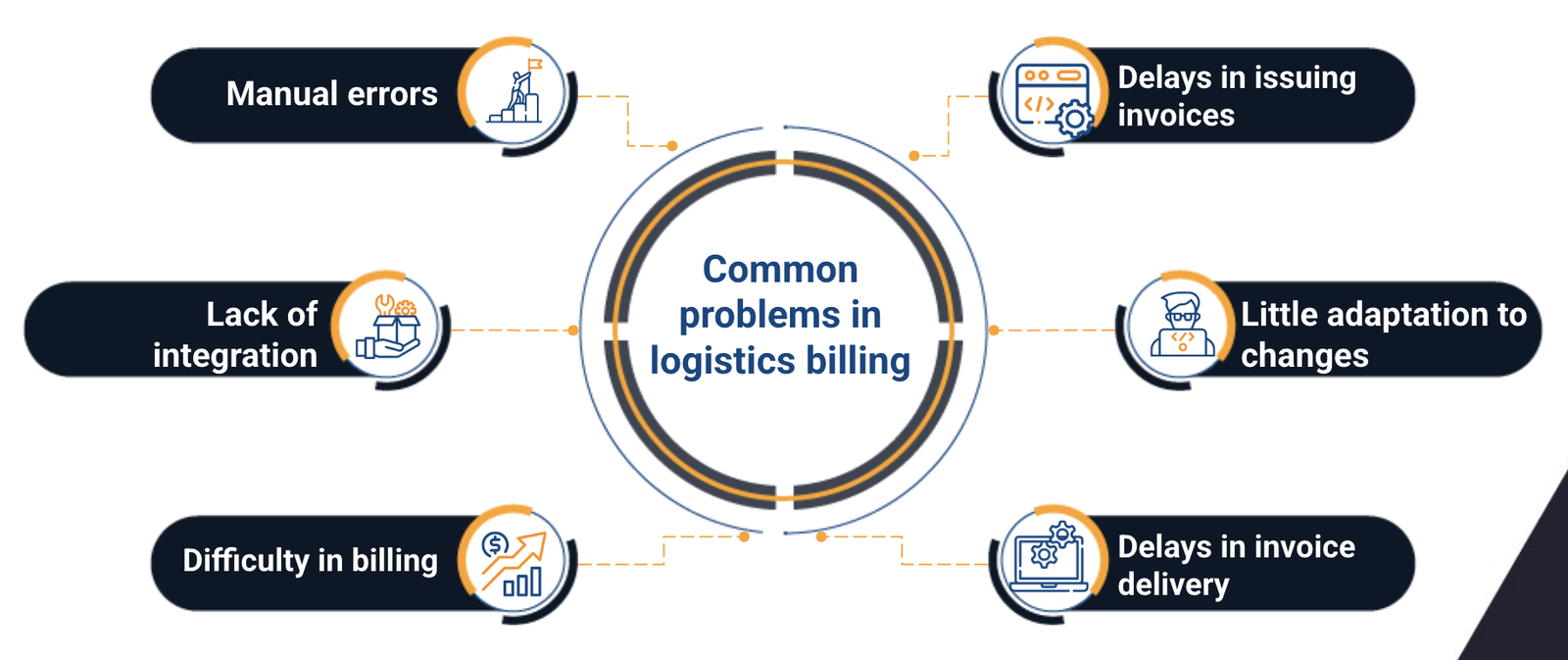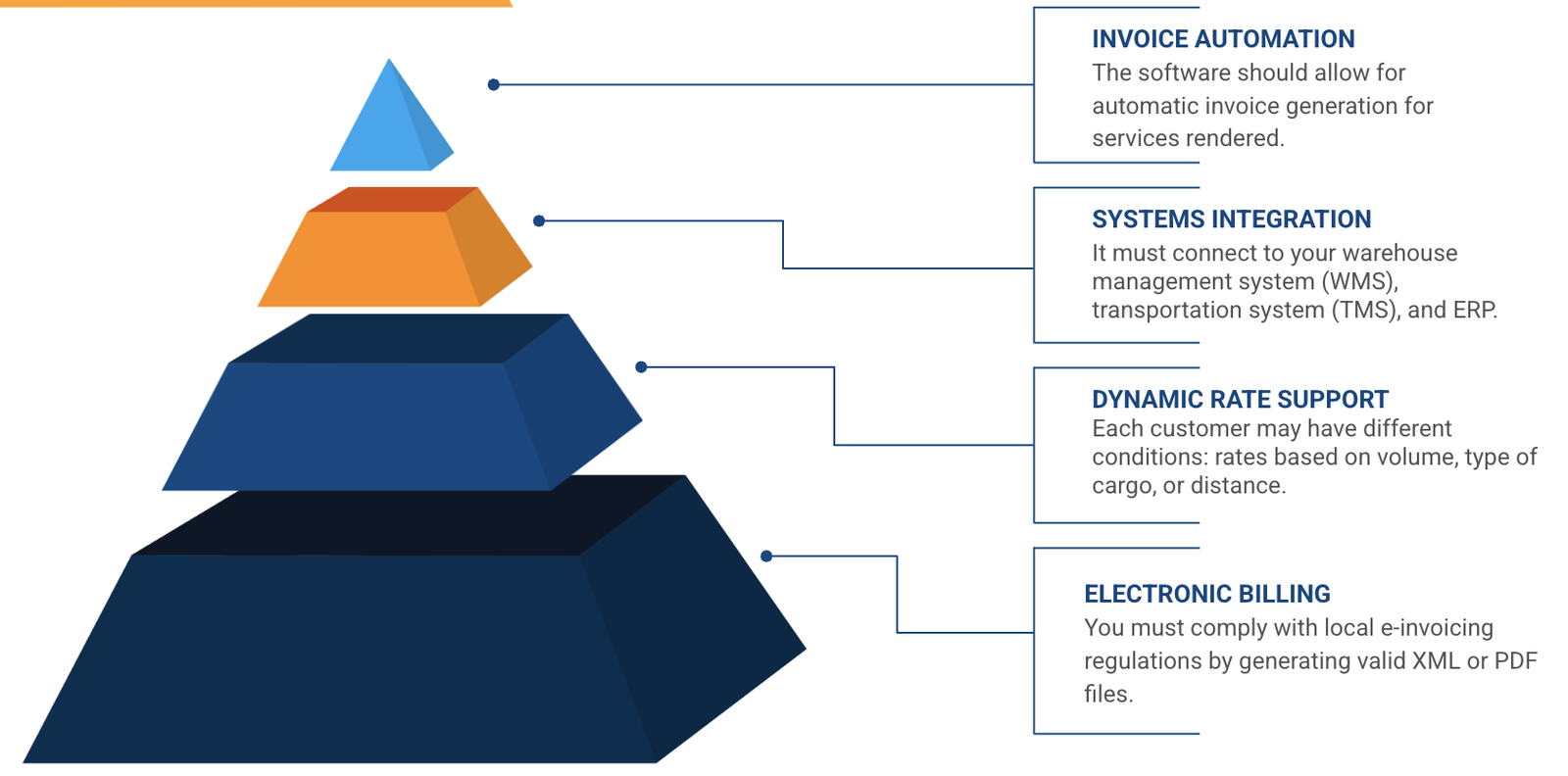
Top features that a billing software for logistics companies should have
Table of contents
Quick Access

Billing in logistics companies is not a simple task. Unlike other sectors, multiple variables come into play here: routes, times, types of cargo, additional services, recurring customers, among others.
All of this means that inefficient management can quickly translate into losses, administrative errors, or payment delays.
“As market demands, customer expectations, and regulatory requirements change, so must the billing application,” they noted in a Deloitte article, pointing to the transformation of billing in business.
If your company is facing any of the problems we mentioned, it's time to evaluate modern solutions that will transform your operations.

Common Problems in Logistics Invoicing
Many logistics company leaders today face a series of recurring pain points that affect the efficiency of their operations:
- Manual errors in invoice generation, which generate disputes or delays in payments.
- Lack of integration with management systems (WMS, TMS, ERP), which requires multiple data entries.
- Difficulty invoicing for customized or variable services, such as special routes or temporary storage.
- Delays in issuing and delivering invoices, affecting cash flow.
- Inability to adapt to local or international tax regulations, especially for companies operating in multiple countries.
In this context, having modern and well-designed billing software for logistics companies is not a luxury, but a strategic necessity.

The role of billing software in a logistics company
Traditional solutions, often created for simpler industries, are no longer sufficient for the dynamism of today's logistics. For this reason, we are now seeing a growing demand for custom-developed billing software for logistics companies, or adapted by industry experts.
A logistics software development company can help you build or implement a solution that not only automates your invoicing processes but also perfectly adapts to your operations, tax, and business needs.
This modern software is transforming operations, allowing companies to reduce errors, improve invoicing time, automate processes, and have full visibility into revenue and accounts receivable.
Key features a logistics billing software should have
When choosing the right system, it is essential to know the essential features it should include. Here are the main ones:
Invoice generation automation
The software should allow for automatic invoice generation based on services performed, without manual intervention. This includes recognition of completed deliveries, warehouse operations, or kilometers traveled. This automation drastically reduces human error and speeds up the process.
Integration with logistics systems
Good billing software for logistics companies should connect with your warehouse management system (WMS), transportation system (TMS), and ERP. This ensures that data flows in real time and eliminates duplication of work. A software development companyLogistics can help you create robust integrations that keep your entire operation synchronized.
Support for dynamic rates and custom contracts
In logistics, there are no one-size-fits-all rates. Each client may have different conditions: rates based on volume, type of cargo, distance, or frequency of services. The software should allow you to configure these rules and apply them automatically when generating the invoice.
Electronic invoicing and tax compliance
The solution must comply with local electronic invoicing regulations, generating XML or PDF files that are valid for tax authorities. Additionally, if you operate in multiple countries, the system must adapt to each regulatory framework.

Multiple currency and language management
Logistics companies often operate internationally. The software should facilitate invoicing in different currencies and allow for issuing documents in the customer's language, which improves the experience and avoids misunderstandings.
Financial KPI reports and dashboards
It's essential that the system includes detailed reports on invoices issued, pending, and overdue, revenue per customer, margins, and more. This gives the finance team a clear view of cash flow and enables informed decision-making. A logistics software development company can customize these reports to reflect your specific needs.
Customer portal
Allowing your customers to access their invoices, payment history, account statements, and download documents directly from a web portal significantly improves business relationships and reduces administrative burden.
- Automatic alerts and reminders: The system should be able to send automatic notifications to customers when an invoice is due, when a new charge is generated, or when a payment is pending. This improves collections and reduces late payments.
- Scalability and customization: As your operation grows, your system should be able to keep up with you. Whether you add new services, warehouses, routes, or countries of operation, invoicing software for logistics companies should be able to scale with you. Working with a logistics software development company allows you to ensure this scalability is built in from the start.
- Security and access control: Financial information is highly sensitive. The system must have configurable user permissions, action traceability, and data encryption to ensure the confidentiality of your operation.
Advantages of working with logistics software development experts
Although there are many generic solutions on the market, nothing replaces a tool developed or adapted by a logistics software development company with real experience in the sector.
These companies understand the specifics of the industry: cargo flows, delivery cycles, transportation regulations, tax rules, among others. Thanks to this, they can design systems that truly meet your needs, avoiding common mistakes such as:
- Choosing software that is too rigid or generic.
- Underestimating the need for integration with other systems.
- Not considering scalability.
- Not knowing local tax regulations.

A strategic investment for your logistics business
Investing in good billing software for logistics companies is an investment in the financial health of your company. It's a decision that directly impacts your operational efficiency, your cash flow, and your customers' experience.
If you're facing challenges with your current system, or if you want to scale your operation without administrative complications, now's the time to do so.explore technological solutions that are truly aligned with your sector.
A logistics software development company like Rootstack can be your ally in this process, offering you robust, scalable solutions that are fully adapted to your operational reality.
At Rootstack, we have experience implementing billing software for logistics companies. Our team has worked with companies in the sector to optimize their processes, reduce errors, and increase their financial performance.